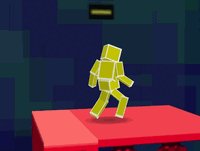Link (SSB)/Up tilt: Difference between revisions
No edit summary |
mNo edit summary |
||
| Line 3: | Line 3: | ||
==Overview== | ==Overview== | ||
[[File:Link Up Tilt Hitbox Smash 64.gif|thumb|Hitbox of Link's up tilt.]] | [[File:Link Up Tilt Hitbox Smash 64.gif|thumb|Hitbox of Link's up tilt.]] | ||
Link swings his sword in an arc above himself, dealing 10% damage, low vertical knockback, and having fairly quick speed, especially compared to his other moves. It can chain into itself at low to moderate percentages, and at moderately high percentages, it can lead into many other moves, such as {{mvsub|Link|SSB|forward tilt}}, {{mvsub|Link|SSB|forward smash}}, or | Link swings his sword in an arc above himself, dealing 10% damage, low vertical knockback, and having fairly quick speed, especially compared to his other moves. It can chain into itself at low to moderate percentages, and at moderately high percentages, it can lead into many other moves, such as {{mvsub|Link|SSB|forward tilt}}, {{mvsub|Link|SSB|forward smash}}, or [[Boomerang]]. An up tilt followed by a forward smash can be used as a KO setup at higher percentages, especially on [[fastfaller]]s, with a forward tilt also having enough power to get the opponent far offstage so Link can followup with some [[ledge]] play. Additionally, at very low percentages, an {{mvsub|Link|SSB|up smash}} can be used to setup an up tilt chain. The angle of the attack changes slightly when facing left or right; when facing right, it knocks opponents slightly more to the right, and vice versa. The move can usually KO at around 200% and above. | ||
In the Japanese version of ''Smash 64'', the move was significantly improved, dealing 14% damage (an extra 4% compared to other versions), sending opponents on a more favourable angle for [[combo]]s, and being usable as a [[shield break combo]] if used repeatedly. | In the Japanese version of ''Smash 64'', the move was significantly improved, dealing 14% damage (an extra 4% compared to other versions), sending opponents on a more favourable angle for [[combo]]s, and being usable as a [[shield break combo]] if used repeatedly. | ||
| Line 12: | Line 12: | ||
[[Category:Link (SSB)]] | [[Category:Link (SSB)]] | ||
[[Category:Up tilts]] | [[Category:Up tilts (SSB)]] | ||
Revision as of 18:03, December 22, 2013
Overview
Link swings his sword in an arc above himself, dealing 10% damage, low vertical knockback, and having fairly quick speed, especially compared to his other moves. It can chain into itself at low to moderate percentages, and at moderately high percentages, it can lead into many other moves, such as forward tilt, forward smash, or Boomerang. An up tilt followed by a forward smash can be used as a KO setup at higher percentages, especially on fastfallers, with a forward tilt also having enough power to get the opponent far offstage so Link can followup with some ledge play. Additionally, at very low percentages, an up smash can be used to setup an up tilt chain. The angle of the attack changes slightly when facing left or right; when facing right, it knocks opponents slightly more to the right, and vice versa. The move can usually KO at around 200% and above.
In the Japanese version of Smash 64, the move was significantly improved, dealing 14% damage (an extra 4% compared to other versions), sending opponents on a more favourable angle for combos, and being usable as a shield break combo if used repeatedly.

